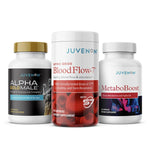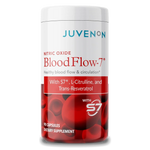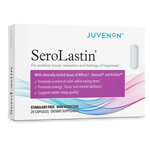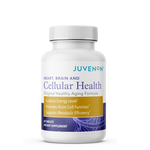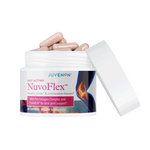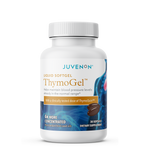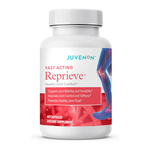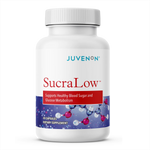
Immune health is a hot topic this year, especially as we enter cold and flu season in the midst of the global COVID-19 pandemic.
Luckily, there are several ways—in addition to practicing good hygiene and following public health recommendations—that you can bolster your body’s natural defenses against sickness this winter.
These strategies include optimizing your health through diet, exercise, proper hydration, and stress management.
Immune Wellness by Juvenon is another wise addition to your winter routine. The supplement contains a potent blend of vitamins, minerals, and compounds that can help strengthen the cells in your body that fight off harmful invaders.
In this article, you will learn:
- The effects of aging on your immune health,
- How to strengthen your immune system naturally through a healthy diet, regular exercise, proper hydration, and managing stress,
- Why Juvenon’s Immune Wellness supplement should be an essential part of your routine this cold/flu/COVID-19 season,
- And how its ingredients—vitamin C, vitamin D, zinc, quercetin, and beta-glucans—help equip your immune cells to better fight off pathogens.
Aging and immune health
It’s common knowledge that, as you age, your immune system weakens. This is a natural process, but it can be exacerbated by medical issues and unhealthy lifestyle choices.
Seniors are at an increased risk of catching and becoming more seriously ill from most viruses, including the flu and COVID-19. This is because of several changes to your immune processes that occur as you age.
Your immune system consists of a number of highly specialized cells that fulfill many different functions—all with the ultimate purpose of isolating and neutralizing invading pathogens.
As you age, though, your body is unable to produce as many of these cells as it was able to when you were younger. Additionally, these cells are more likely to have defects that interfere with their ability to function normally. And finally, these cells may be more likely to mis-identify healthy cells as invaders and launch an autoimmune attack—in which your immune system attacks your own healthy cells. (1, 2)
Although these age-related changes are unavoidable, there are several ways you can help your immune system to function more effectively through lifestyle changes.
Strengthening your immune health naturally
Unhealthy lifestyle choices and a high-stress lifestyle can actually compound aging-related declines in your immune health, which is why it’s so important to follow a healthy lifestyle and minimize stressors in your life. Here are several strategies to help you naturally improve your body’s response to disease-causing invaders.
Diet
Eating a healthy, balanced diet is one of the best ways to ensure your body has the raw materials it needs to manufacture healthy immune cells.
Including a variety of fruits and vegetables ensures that your body has nutrients and antioxidants in sufficient amounts to function properly and create healthy new cells.
Additionally, you need adequate amounts of protein—from meat, fish, dairy, eggs, beans, nuts or seeds—to create new tissues and maintain your muscle mass.
A balanced diet will also include adequate amounts of fiber from fruits, vegetables, whole grains, or other plant foods. Fiber is a prebiotic, or a food source for the beneficial bacteria that reside in your gut. And surprisingly, the gut is a major immune organ—providing one of the body’s first lines of defense against harmful invaders. (3)
For this same reason, many people take probiotic supplements or include fermented foods in their diet to boost their immune system—because probiotics and fermented foods introduce more live, healthy bacteria to your digestive tract.
Finally, you should also try to limit added sugars and highly processed foods. These foods have been linked to an increased risk of autoimmune diseases, in which your immune system functions improperly by attacking its own healthy cells. They may also contribute disproportionately to weight gain, and carrying excess weight may also suppress your body’s immune response to disease-causing invaders. (4)
Exercise
Regular exercise may also stimulate your immune system, although the effect may be indirect. If you’re more healthy and well overall, then your body will naturally have more resources to expend towards fighting off pathogens. (5)
In fact, interestingly, some research shows that exercise can actually boost the effectiveness of the flu vaccine, which could theoretically decrease your risk of catching the flu. (6)
If you’re able, you should try to get 150 minutes of moderate exercise per week. However, any exercise that you’re able to safely do without injury is better than none.
Hydration

Staying adequately hydrated is another way that you can indirectly affect your immune health. Seniors and older people are at an increased risk of dehydration for a number of reasons, and even mild dehydration can put you at risk of more severe health problems—which exposes you to a weakened immune response to disease-causing bacteria and viruses. (7)
Some easy-to-assess signs that you’re adequately hydrated include that you consistently drink enough fluid to quench your thirst, and that your urine is clear or pale yellow.
However, if you live in a hot climate, work or spend time outside regularly, or exercise vigorously, you’ll probably need to drink more water.
Stress management
Stress isn’t just bad for your mind, it actually causes a number of physical changes as well. While short-term stress can actually be protective, long-term stress is extremely detrimental to your health in a number of ways, not the least of which is weakening your immune system.
Stress can suppress your immune system, increasing your susceptibility to illness and making it more likely that your illness is more severe.
Prolonged stress actually weakens your immune system’s Natural Killer (NK) cells, which are specialized cells that attack and destroy cells that have been infected by viruses. Although your immune system does have other cells that can attack infection, the NK cells are one of your body’s first and most powerful lines of defense. A weakened NK cell response could result in a more severe illness. (8)
This is why it’s so important to manage stress in healthy ways, whether it be through yoga, mindfulness, engaging in hobbies you enjoy, or seeking professional help with a counselor or therapist.
Juvenon Immune Wellness
Another way to help bolster your innate defense system is to take proven supplements that may help reduce your risk of catching an illness or reduce the length or severity of your illness.
Juvenon Immune Wellness is one convenient product that combines several evidence-based, scientifically studied ingredients that have been shown to help your body better fight off infection and illness. It contains a unique blend of vitamin C, vitamin D, zinc, quercetin, and beta-glucans.
Nutrients That Help Boost Your Immune System
Vitamin C
Vitamin C is an essential nutrient that’s widely touted as an immune booster. In fact, stores struggled to keep it in stock when the COVID-19 pandemic arrived in the U.S. While there’s strong evidence to support the use of high-dose, intravenous vitamin C for severe respiratory viruses, there’s also some evidence showing that taking vitamin C orally may strengthen your immune cells. (9)
Vitamin C is great for your skin, which is the largest immune organ and represents your body’s very first line of defense against invaders. (9)
Vitamin C also strengthens your phagocytes, specialized immune cells that are tasked with “swallowing up” pathogens. It may also help your body to create other specialized white blood cells. (9)
Vitamin D
Vitamin D, like Vitamin C, is a vital nutrient that plays a key role in regulating your immune health. Your immune cells contain vitamin D receptors, and it appears that vitamin D may help your immune cells to differentiate between healthy cells and invading pathogens—because vitamin D’s biggest role seems to be in reducing autoimmunity.
For this reason, vitamin D may help improve seasonal allergies (10)
Zinc
Zinc is an important immune-regulating mineral that’s required by your body for hundreds of biochemical processes. Zinc deficiency, although fairly rare, can lead to devastating immune weakness.
One review of 17 studies with over 2,000 participants suggests that taking zinc orally may help to shorten the common cold by nearly 2 days compared to a placebo. (11)
Research also suggests that people who are zinc deficient are also more likely to have autoimmune disorders than the healthy population. (12)
Quercetin
Quercetin is a non-essential compound that’s derived from plants—like kale and broccoli—that boasts a number of potential benefits in regards to your immune health.
It has direct antiviral properties in test-tube studies, and may also help reduce allergies, which are a type of misdirected immune response to non-harmful substances.
The compound also stimulates your immune system and helps your body neutralize harmful free radical compounds. (13)
Beta-Glucans
Beta-glucans are a specialized type of fiber found in the cell walls of certain organisms, like yeasts, fungi, seaweed, and oats.
As mentioned above, fiber is a prebiotic that serves as a food source for the healthy bacteria in your gut. However, beta-glucans appear to have some specialized function in regards to your immune health. They can help your immune cells mount a stronger offense against invaders, making it easier for these cells to neutralize threats and keep them from infecting your cells or proliferating (14).
Summary
With this winter bringing us a convergence of cold and flu season and the COVID-19 pandemic, immune health is top of mind for many people.
Keeping your immune system in fighting shape is especially important as you get older, because it naturally weakens with age. This is why older people are more susceptible to serious viral illness.
Luckily, though, there are several ways you can strengthen your body’s defenses against harmful invaders through healthy lifestyle choices, including eating a healthy diet, exercising regularly, staying adequately hydrated, and reducing your stress levels.
Additionally, Juvenon’s Immune Wellness supplement—containing the powerful wellness-enhancing agents vitamin C, vitamin D, zinc, quercetin, and beta-glucan—is an excellent way to help keep your immune system in tip-top shape in this time when it’s more important than ever.
References:
- Yaqoob P. Ageing alters the impact of nutrition on immune function. Proc Nutr Soc. 2017;76(3):347-351. doi:10.1017/S0029665116000781
- Djukic M, Nau R, Sieber C. Das alternde Immunsystem [The ageing immune system]. Dtsch Med Wochenschr. 2014;139(40):1987-1990. doi:10.1055/s-0034-1370283
- Pandey KR, Naik SR, Vakil BV. Probiotics, prebiotics and synbiotics- a review. J Food Sci Technol. 2015;52(12):7577-7587. doi:10.1007/s13197-015-1921-1
- Myles IA. Fast food fever: reviewing the impacts of the Western diet on immunity. Nutr J. 2014;13:61. Published 2014 Jun 17. doi:10.1186/1475-2891-13-61
- Campbell JP, Turner JE. Debunking the Myth of Exercise-Induced Immune Suppression: Redefining the Impact of Exercise on Immunological Health Across the Lifespan. Front Immunol. 2018;9:648. Published 2018 Apr 16. doi:10.3389/fimmu.2018.00648
- Woods JA, Keylock KT, Lowder T, et al. Cardiovascular exercise training extends influenza vaccine seroprotection in sedentary older adults: the immune function intervention trial. J Am Geriatr Soc. 2009;57(12):2183-2191. doi:10.1111/j.1532-5415.2009.02563.x
- Hooper L, Bunn D, Jimoh FO, Fairweather-Tait SJ. Water-loss dehydration and aging. Mech Ageing Dev. 2014;136-137:50-58. doi:10.1016/j.mad.2013.11.009
- Dragoş D, Tănăsescu MD. The effect of stress on the defense systems. J Med Life. 2010;3(1):10-18.
- Carr AC, Maggini S. Vitamin C and Immune Function. Nutrients. 2017;9(11):1211. Published 2017 Nov 3. doi:10.3390/nu9111211
- Prietl B, Treiber G, Pieber TR, Amrein K. Vitamin D and immune function. Nutrients. 2013;5(7):2502-2521. Published 2013 Jul 5. doi:10.3390/nu5072502
- Science M, Johnstone J, Roth DE, Guyatt G, Loeb M. Zinc for the treatment of the common cold: a systematic review and meta-analysis of randomized controlled trials. CMAJ. 2012;184(10):E551-E561. doi:10.1503/cmaj.111990
- Sanna A, Firinu D, Zavattari P, Valera P. Zinc Status and Autoimmunity: A Systematic Review and Meta-Analysis. Nutrients. 2018;10(1):68. Published 2018 Jan 11. doi:10.3390/nu10010068
- Mlcek J, Jurikova T, Skrovankova S, Sochor J. Quercetin and Its Anti-Allergic Immune Response. Molecules. 2016;21(5):623. Published 2016 May 12. doi:10.3390/molecules21050623
- De Marco Castro E, Calder PC, Roche HM. β-1,3/1,6-Glucans and Immunity: State of the Art and Future Directions [published online ahead of print, 2020 Mar 29]. Mol Nutr Food Res. 2020;e1901071. doi:10.1002/mnfr.201901071

